France
Her baby could well be born and grow up there, in the middle of the tents, and this is her greatest fear. The Ivorian Ange, eight months pregnant, is one of the exiles who "are not even allowed on the street". So she sleeps hidden in a Parisian parking lot, transformed into a camp.
Every night for the past few weeks, Ange, who refused to give her name so as "not to worry the family", rushes into the parking lot, a stone's throw from the Arc de Triomphe, painstakingly climbs the circular ramp reserved for cars and takes her place in one of the forty tents on the platform, where about 70 migrants live, hidden from view.
An improvised kitchenette, two toilets, a few electrical outlets, a car space that serves as storage for suitcases, some of which are mounted on wheeled carts. Above all, a bearable temperature, while it is negative outside, on this March 1st.
"It's better than being outside," sums up the 29-year-old woman, who has "always been on the street" since she arrived in France in December. "Being housed is my greatest wish. But when I call 115 (the emergency number dedicated to the homeless, editor's note), they tell me it's full."
Just the day before, for her pregnancy, she went to the Parisian hospital of Pitié Salpêtrière. "But the doctor can't do anything. All I want is for my daughter not to sleep outside," she flinches, sitting in her tent.
"Dignity"
The place, made available to the association Utopia 56 by a private individual, is as unusual as it is symptomatic of the "political will to +invisibilize+ exiled people," says Nikolai Posner, a manager of the organization.
"It's not a four-star hotel, it's a place of transition, which allows us to offer a little dignity to these people (...) so that they can rest and concentrate on their reconstruction", he justifies.
Utopia 56 believes that "police harassment is put in place so that people do not settle in the public space". "Today they are even forbidden to be on the street", Nikolaï Posner denounces.
The association estimates that there are "thousands" of exiles hidden in squats or places like this parking lot, since the dismantling of camps in the north-east of Paris, synchronous with the authorities' desire not to allow other "fixation points" to be set up, since 2020.
Result: "We count 400 migrants on the street at the moment in the Paris region, while the arrivals remain significant. We are aware that this is very underestimated", agrees Delphine Rouilleault, director of France terre d'asile, whose counts are a reference for the authorities.
A desire to "disperse" that is accompanied by another "reality", agrees Pascal Brice, the head of the Federation of Actors of Solidarity (FAS), which includes the main organizations helping the homeless: "We have hotels that end their agreement of emergency accommodation and put people back on the street in order to accommodate visitors to the Olympic Games.
Closed door?
"The director of the French Office of Immigration and Integration (Ofii) Didier Leschi defends the fact that "75% of asylum seekers are sheltered", including 1,800 people "directed to the region each month".
However, hundreds of people remain without a solution, like Khadija Koné, a 26-year-old mother from Côte d'Ivoire. Every evening for the past two months, the same ritual: wandering the streets during the day, until the gate of the parking lot opens around 8 pm.
"The street is very hard," she stammers, in the tent she shares with her 3-year-old daughter. Her blue t-shirt, khaki pants, and vest are "all she owns" after fleeing "abuse" in Libya and Tunisia.
Like her, Sima Hamala, a 27-year-old Malian newcomer, finds that the place, as basic as it is, offers "the essentials: to be sheltered, to be able to rest, to have a hot coffee.
He too has only known the street in Paris, with his wife, after a journey through Africa, the Mediterranean and Europe.
In April, the association will have to leave the parking lot.
Sima Hamala discovered it just now and smiles with fear: "If they close, it will be very, very difficult for us".




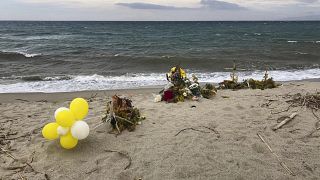
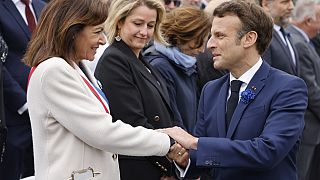
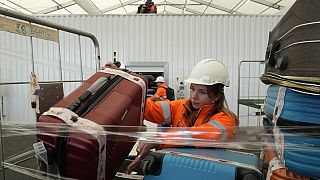
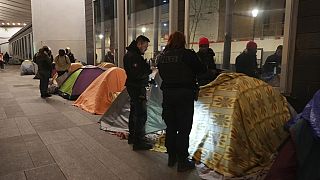
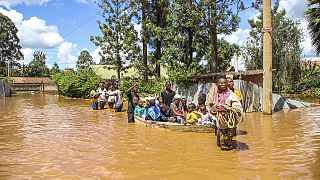

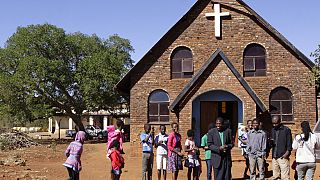
Go to video
Expulsions in Rwanda: genesis of a controversial bill
01:09
At least 16 dead in latest migrant boat tragedy off the coast of Djibouti
Go to video
Spain: 2 smugglers convicted for the death of 4 Moroccan migrants
01:36
Italian PM Giorgia Meloni visits Tunisia to discuss migration
00:48
Corpses found adrift in boat off Brazil likely migrants from Mauritania, Mali - Police
01:23
Paris 2024 Olympics: athletic track colour revealed